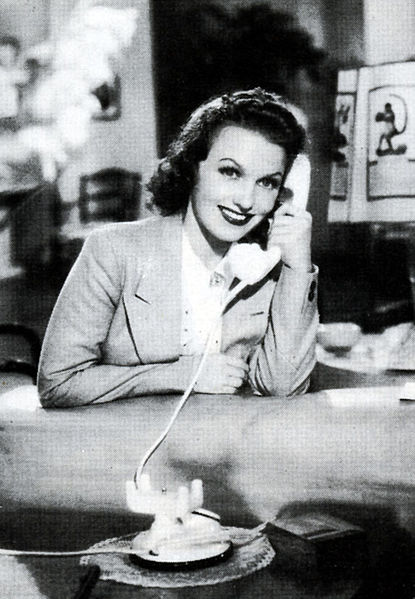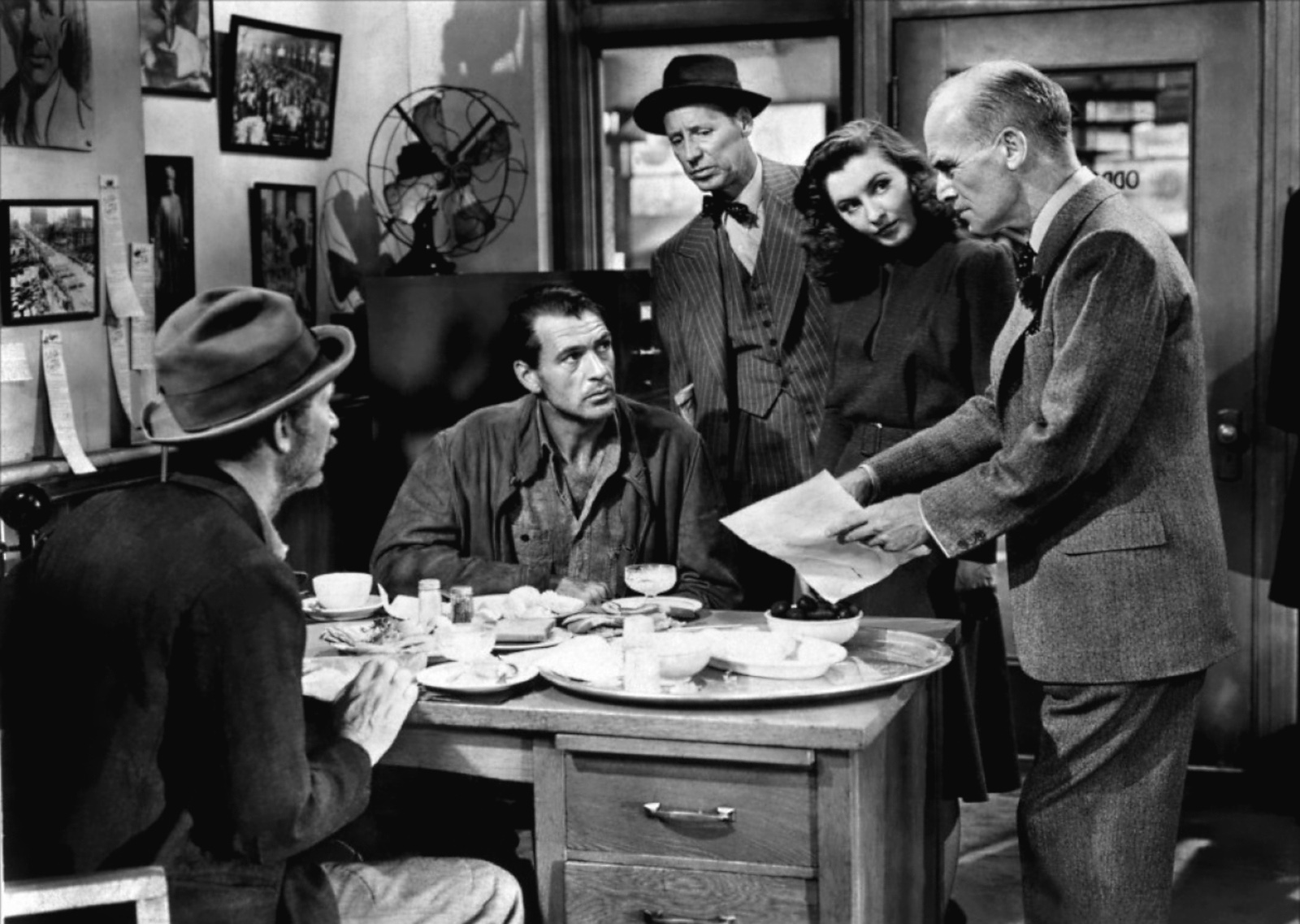|
White Telephone
''Telefoni Bianchi'' (; white telephones) films, also called deco films, were made by Italian film industry in the 1930s and the 1940s in imitation of American comedies of the time in a sharp contrast to the other important style of the era, calligrafismo, which was highly artistic. The cinema of ''Telefoni Bianchi'' was born from the success of the Italian film comedy of the early 1930s; it was a lighter version, cleansed of any intellectualism or veiled social criticism. Name The name derives from the presence of white telephones in the sequences of the first films produced in this period, symptomatic of social well-being, a status symbol capable of marking the difference from the "popular" bakelite telephones, cheaper and therefore more widespread, which instead were black. Another definition given to these films is "deco cinema" due to the strong presence of furnishing objects that recall the international deco style, in vogue in those years. Origins The roots of the ' ... [...More Info...] [...Related Items...] OR: [Wikipedia] [Google] [Baidu] |
Gino Carlo Sensani
Gino Sensani (1888–1947) was an Italian costume designer who worked on over eighty films during his career.Reich & Garofalo p.330 Selected filmography * ''Loyalty of Love'' (1934) * '' Naples of Former Days'' (1938) * ''Kean'' (1940) * ''Beatrice Cenci'' (1941) * ''Pirates of Malaya'' (1941) * ''The Countess of Castiglione'' (1942) * '' Flesh Will Surrender'' (1947) * ''The Brothers Karamazov'' (1947) * ''Daniele Cortis ''Daniele Cortis'' (also known as ''Elena'') is a 1947 Italian drama film directed by Mario Soldati and starring Vittorio Gassman, Sarah Churchill and Gino Cervi. The film (set in nineteenth-century Italy) follows the impossible love affair bet ...'' (1947) References Bibliography * Reich, Jacqueline & Garofalo, Piero. ''Re-viewing Fascism: Italian Cinema, 1922-1943''. Indiana University Press, 2002. External links * 1888 births 1947 deaths Italian costume designers People from the Province of Siena {{Italy-film-bio-stub ... [...More Info...] [...Related Items...] OR: [Wikipedia] [Google] [Baidu] |
Teresa Venerdì
''Teresa Venerdì'' is a 1941 Italian " white-telephones" comedy film directed by Vittorio De Sica. Cast *Vittorio De Sica ... Il dottore Pietro Vignali *Adriana Benetti ... Teresa Venerdì *Irasema Dilián ... Lilli Passalacqua *Guglielmo Barnabò ... Agostino Passalacqua *Olga Vittoria Gentilli ... Rosa Passalacqua *Anna Magnani ... Maddalena Tentini/Loretta Prima *Elvira Betrone ... La direttrice dell'orfanotrofio *Giuditta Rissone ... L'istitutrice Anna *Virgilio Riento ... Antonio *Annibale Betrone ... Umberto Vignali *Nico Pepe ... Il dottore Pasquale Grosso *Clara Auteri Pepe ... Giuseppina * Zaira La Fratta ... Alice *Alessandra Adari ... L'istitutrice Caterina *Lina Marengo Lina Marengo (19 January 1911 – 6 February 1987) was an Italian character actress. She played in over 30 films, and was most active between 1938 and 1943. Biography Marengo was born in Rome and her film debut was in '' Casta Diva'' (1935), di ... ... La maestra Ricc ... [...More Info...] [...Related Items...] OR: [Wikipedia] [Google] [Baidu] |
Maddalena, Zero For Conduct
''Maddalena, Zero for Conduct'' (Italian: ''Maddalena... zero in condotta'') is a 1940 Italian " white-telephones" comedy film directed by Vittorio De Sica.Cardullo p.117 It is a remake of the Hungarian film ''Magda Expelled'' (1938). Plot A mysterious love letter arrives to Alfredo Hartman (Vittorio De Sica) in Vienna, and he goes to Rome to find who wrote it. Cast *Vittorio De Sica as Alfredo Hartman *Vera Bergman as L'insegnante Elisa Malgari *Carla Del Poggio as Maddalena Lenci *Irasema Dilián as Eva Barta, la privatista (as Eva Dilian) *Amelia Chellini as La direttrice *Pina Renzi as La professoressa Varzi *Paola Veneroni as L'allieva Varghetti, la spiona * Dora Bini as L'allieva Caricati *Enza Delbi as Un'allieva * Roberto Villa as Stefano Armani *Armando Migliari as Malesci, il professore di chimica *Guglielmo Barnabò as Il signor Emilio Lenci *Giuseppe Varni as Amilcare Bondani, il bidello *Arturo Bragaglia Arturo Bragaglia (7 January 1893 – 21 January 1962) wa ... [...More Info...] [...Related Items...] OR: [Wikipedia] [Google] [Baidu] |
Vittorio De Sica
Vittorio De Sica ( , ; 7 July 1901 – 13 November 1974) was an Italian film director and actor, a leading figure in the neorealist movement. Four of the films he directed won Academy Awards: ''Sciuscià'' and ''Bicycle Thieves'' (honorary), while ''Yesterday, Today and Tomorrow'' and '' Il giardino dei Finzi Contini'' won the Academy Award for Best Foreign Language Film. Indeed, the great critical success of ''Sciuscià'' (the first foreign film to be so recognized by the Academy of Motion Picture Arts and Sciences) and ''Bicycle Thieves'' helped establish the permanent Best Foreign Film Award. These two films are considered part of the canon of classic cinema. ''Bicycle Thieves'' was deemed the greatest film of all time by ''Sight & Sound'' magazine's poll of filmmakers and critics in 1958, and was cited by Turner Classic Movies as one of the 15 most influential films in cinema history. De Sica was also nominated for the 1957 Oscar for Best Supporting Actor for playing M ... [...More Info...] [...Related Items...] OR: [Wikipedia] [Google] [Baidu] |
I'll Give A Million (1935 Film)
''I'll Give a Million'' ( it, Darò un milione) is a 1935 Italian " white-telephones" comedy film directed by Mario Camerini and starring Vittorio De Sica. It is based on the first screenplay by Cesare Zavattini which tells the story of a disillusioned millionaire who, tired of the attempts of greedy friends and relatives to sponge off of him, becomes a bum in order to find a decent human being. It had an American remake in 1938, again titled '' I'll Give a Million'' and starring Warner Baxter as the millionaire. It was shot at the Cines Studios in Rome. Plot A millionaire is about to commit suicide by leaping off of his yacht into the sea. He is just about to go when he spies a bum attempting suicide himself. The rich man saves the bum and tells him of his frustration with his friends and relatives who are always seeking a handout. He then claims that he will give a million francs to the first person to treat him kindly without thinking about his wealth. The next day, the tramp ... [...More Info...] [...Related Items...] OR: [Wikipedia] [Google] [Baidu] |
René Clair
René Clair (11 November 1898 – 15 March 1981), born René-Lucien Chomette, was a French filmmaker and writer. He first established his reputation in the 1920s as a director of silent films in which comedy was often mingled with fantasy. He went on to make some of the most innovative early sound films in France, before going abroad to work in the UK and USA for more than a decade. Returning to France after World War II, he continued to make films that were characterised by their elegance and wit, often presenting a nostalgic view of French life in earlier years. He was elected to the Académie française in 1960. Clair's best known films include '' Un chapeau de paille d'Italie'' (''The Italian Straw Hat'', 1928), '' Sous les toits de Paris'' (''Under the Roofs of Paris'', 1930), ''Le Million'' (1931), ''À nous la liberté'' (1931), ''I Married a Witch'' (1942), and ''And Then There Were None'' (1945). Early life René Clair was born and grew up in Paris in the district of Les ... [...More Info...] [...Related Items...] OR: [Wikipedia] [Google] [Baidu] |
Heartbeat (1939 Film)
''Heartbeat'' (Italian: ''Batticuore'') is a 1939 Italian " white-telephones" comedy film directed by Mario Camerini and starring Assia Noris, John Lodge and Rubi D'Alma. It remade in France as '' Beating Heart'' in 1940, and then again in Hollywood as a 1946 film of the same title starring Ginger Rogers and Basil Rathbone.Ricci p.148 It was shot at the Cinecittà Studios in Rome. The film's sets were designed by the art director Gastone Medin. It is part of the tradition of White Telephone comedies. Synopsis In Paris a young woman working at a school for thieves attempts to pick the pocket of an aristocrat. Instead of turning her in he blackmails her into stealing a clock from an ambassador An ambassador is an official envoy, especially a high-ranking diplomat who represents a state and is usually accredited to another sovereign state or to an international organization as the resident representative of their own government or s .... Cast References Bibliograp ... [...More Info...] [...Related Items...] OR: [Wikipedia] [Google] [Baidu] |
Frank Capra
Frank Russell Capra (born Francesco Rosario Capra; May 18, 1897 – September 3, 1991) was an Italian-born American film director, producer and writer who became the creative force behind some of the major award-winning films of the 1930s and 1940s. Born in Italy and raised in Los Angeles from the age of five, his rags-to-riches story has led film historians such as Ian Freer to consider him the " American Dream personified".Freer 2009, pp. 40–41. Capra became one of America's most influential directors during the 1930s, winning three Academy Awards for Best Director from six nominations, along with three other Oscar wins from nine nominations in other categories. Among his leading films were ''It Happened One Night'' (1934), ''Mr. Deeds Goes to Town'' (1936), '' You Can't Take It with You'' (1938), and '' Mr. Smith Goes to Washington'' (1939). During World War II, Capra served in the U.S. Army Signal Corps and produced propaganda films, such as the ''Why We Fight'' seri ... [...More Info...] [...Related Items...] OR: [Wikipedia] [Google] [Baidu] |
Department Store (1939 Film)
''Department Store'' (Italian:''I grandi magazzini'') is a 1939 Italian " white-telephones" comedy film directed by Mario Camerini. It was made at the Cinecittà studios in Rome. The film entered the competition at the 7th Venice International Film Festival. Cast *Vittorio De Sica as Bruno Zacchi * Assia Noris as Lauretta Corelli * Enrico Glori as Bertini, il capo del personale * Luisella Beghi as Emilia * Virgilio Riento as Gaetano * Milena Penovich as Anna * Andrea Checchi as Maurizio * Mattia Giancola as Pietro - il fratello di Anna * Renato Alberini * Aldo Capacci as Il giovane dell'ascensore * Nino Crisman as L'ispettore dei magazzini * Dhia Cristiani as La commessa del reparto mobili * Dino De Laurentiis as Un fattorino * Peppino De Martino as L'impiegato addetto ai cartellini * Giovanni Ferrari * Alba Ferrarotti as Una commessa * Diana Floriani as Una commessa * Nora Lenner as Una commessa * Loredana as Una commessa * Mirto Lusso * ... [...More Info...] [...Related Items...] OR: [Wikipedia] [Google] [Baidu] |
Il Signor Max
''Il Signor Max'' is a 1937 Italian " white-telephones" comedy film directed by Mario Camerini and starring Vittorio De Sica and Assia Noris. Plot Gianni is a poor, young newspaper salesman in Rome. However, during his vacations he poses as Count Max Varaldo, an aristocrat. Once, on a cruise in Naples, he meets Donna Paola, a wealthy snob, and her maid Lauretta (a common, shy girl). After trying to establish a relationship with Donna Paola, Gianni, disappointed, decides to drop his alter ego Max and propose to Lauretta. However, she now believes that he is a Count. A series of humorous misunderstandings will happen before things get cleared. Cast *Vittorio De Sica as Gianni/Max Varaldo *Assia Noris as Lauretta *Rubi Dalma as Donna Paola * Umberto Melnati as Riccardo *Lilia Dale as Pucci (billed as Adonella) *Virgilio Riento as Pepe * Mario Casaleggio as Uncle Pietro * Caterina Collo as Aunt Lucia *Ernesto Ghigi as Pierino *Romolo Costa as Commandante Baldi *Lilia Silvi a ... [...More Info...] [...Related Items...] OR: [Wikipedia] [Google] [Baidu] |

.jpg)
